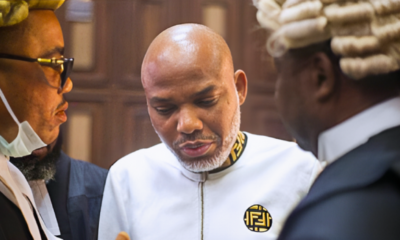Inside Nigeria
Kanu files appeal against Justice Nyako’s ruling over objection to court’s jurisdiction

Mazi Nnamdi Kanu, the leader of the Indigenous People of Biafra (IPOB), has appealed the June 19 ruling of the Federal High Court in Abuja, which was presided over by Justice Binta Nyako.
Kanu objected to the court’s jurisdiction to subject him to trial.
The notice of appeal was submitted to the Court of Appeal in Abuja by Kanu’s Special Counsel, Chief Aloy Ejimakor, on Tuesday.
This was disclosed by Ejimakor in a statement.
The statement made available to Vanguard Tuesday night read:”Earlier today (Tuesday), I filed a Notice of Appeal with the Court of Appeal in Abuja against the 19th June 2024 ruling of Justice Binta Murtala-Nyako, refusing Mazi Nnamdi Kanu’s application objecting to the jurisdiction of the Federal High Court to subject him to trial.
” The grounds of the objection are seven and mostly predicated on provisions of the Constitution, the Terrorism Prevention and Prohibition Act 2022 and other pertinent statutes.”
The Federal Government to Nigeria is the only Respondent, and to be served through her Counsel, Asiwaju Adegboyega Awomolo, SAN.
Kanu has remained at the Abuja headquarters of the Department of State Services, DSS, since his extraordinary rendition from Kenya in June 2021.
The notice of appeal further read:”TAKE NOTICE that the Appellant being dissatisfied with the Ruling of the Federal High Court, Abuja Division coram: B.F.M Nyako, J. delivered on the 19th June, 2024, more particularly set out in Paragraph 2, doth hereby appeal to the Court of Appeal, Abuja upon the grounds set out in Paragraph 3 below and will at the hearing of the Appeal seek the Reliefs set out in Paragraph 4 of this Notice of Appeal..
“AND TAKE FURTHER NOTICE that the names and addresses of persons directly affected by this appeal are those set out in Paragraph 5.
“Ground one:Error in law: The Learned Trial Judge erred in law and occasioned grave miscarriage of justice against the Appellant when the trial Court held that “The main claim in this application deals with the counts of charge the Defendant is facing. These counts of charge that this Court had retained after a considered ruling on the counts of charge dismissing 8 of the original counts. The main issue is that, if the Defendant has a problem with the counts of charge retained, the option open is appeal.
“Particulars of the error: The part of the Ruling by the court below that states that “The main issue is that, if the Defendant has a problem with the counts of charge retained, the option open is appeal” is an erroneous statement of the law for the following reasons:
“a. As a matter of law, the Appellant is, after the remission from the Supreme Court to the court below, entitled to raise any further preliminary objection to jurisdiction on Grounds not raised in the previous preliminary objection that reduced the initial Counts of the Charges from 15 (fifteen) to 7 (seven).
“b. As a matter of trite law, the Appellant can only exercise the option of appeal after the trial court has pronounced a ruling on the instant preliminary objection, not before. It is markedly strange, in our jurisprudence, to suggest (as the trial court did) that appeal of the said seven (7) Counts (remitted from the Supreme Court) should precede or take the place of the instant preliminary objection raised before the court below. Thus, the Appellant cannot be expected to proceed on appeal over the validity or otherwise of the Counts when the issues had never been raised and ruled upon by the trial court.
“2, The previous jurisdictional issues raised by the Appellant against the erstwhile 15 counts and which were decided by the Supreme Court was on the basis of the Extraordinary Rendition of the Appellant and other Grounds not raised in the preliminary objection that is the subject of this Appeal.
“3, The Supreme Court in its decision never foreclosed the Appellant from raising other jurisdiction issues affecting the retained counts/charges; instead the Supreme Court had in fact contemplated (or pre-exempted from its judgment) further objections to the jurisdiction of the trial Court when, in its lead judgment at Page 46, the apex court stated as follows:
“In the above premises, the duty to consider and make pronouncements on the other issues in this Appeal, is abated particularly since the trial court is clothed with the requisite jurisdiction to proceed with trial of the Respondent during, in the course of, or at which some of these issues may be raised or arise”.
“4, Further to the above, especially as it concerns the validity of the remaining or “retained” Counts of Charge, the trial court conceded or correctly stated that “the Supreme Court did not determine the validity of the counts”, thus occasioning a grave miscarriage by refusing to make said determination when the instant application was on the validity of the said retained counts.
“Ground two: Error in law
The trial court erred in law when it considered only one out of the seven (7) ‘jurisdictional’ Grounds raised in the preliminary objection), said lone Ground bordering on the repeal of the Terrorism Prevention Amendment Act 2013 (TPAA 2013), which thus occasioned a grave miscarriage of justice against the Appellant.
” Particulars of the error:
1, As can be gleaned from its Ruling, the Honorable trial court did not consider the following Grounds of objection to its jurisdiction:
“a. Regarding COUNTS 1,2,3,4,5 and 8, the provisions of the Terrorism Prevention Act 2011 (as amended in 2013) under which the IPOB was proscribed and declared a terrorist group are inconsistent with the provisions of the Nigerian Constitution, and are thus void to the extent of the inconsistency.
“b, Regarding COUNTS 1,2,3,4,5 and 8, there is a subsisting judgment of a High Court to the effect that the executive action leading to the declaration of IPOB as a terrorist group and its proscription is unconstitutional.
“c, Count 3 of the charges against the Appellant is unconstitutional as it seeks to punish the Appellant for an act that was not a crime when it occurred and is otherwise an abuse of process.
“d, COUNTS 1,2,3,4,5 and 8 are incurably defective as the Appellant is misled by the failure to state the place or where the alleged offenses were committed and the specific dates of the alleged broadcasts.
“e, Count 15 is not in compliance with the Administration of Criminal Justice Act; it is not within the territorial jurisdiction of this Honorable Court; and it is not supported by any proof of evidence; and Law under which Applicant is being tried in these Counts has otherwise been repealed.
“2. The failure of the trial Court to determine the said foregoing six (6) Grounds is manifestly wrong and a denial of the Appellant’s rights to fair hearing, since the Appellant ought to know the competence or otherwise of the counts before being subjected to strenuous pretrial detention and trial over the manifestly incompetent counts affected by the said Grounds not determined by the trial court.
“3, Further, in its said consideration of the said Ground of objection (bordering only on repeal of TPAA 2013) and in ruling the way that it did, the Honorable trial court erred by ruling against the settled law that a repealed law can only sustain a completed or concluded prosecution and where not so concluded, the charges/counts become abated and incompetent.
“4, The binding decisions of Amona & ORS Vs. Incorporated Trustees of Omadino Development Association & Ors (2004) LPELR-12610 (CA) andNCAA Vs. Project Eagle Air Ltd & ORS (2021) LPELR-53105 (CA) on the incompetence of charges/counts founded on repealed laws were adverted to the trial court, but the court ignored them and relied on no judicial or statutory authority to overrule the Appellant’s Notice of Preliminary Objection.”
































